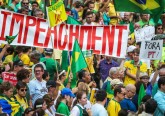The historical defeat of Dilma Rousseff on 17 April, when more than two-thirds of Brazil’s lower House of Congress voted to oust the country’s first female president, is not the end of the debate about whether she committed a crime that would constitutionally justify her impeachment. The opposition claims that the president, elected with more than fifty-four million votes, used accounting tricks to artificially lower the government’s budget deficit. Her supporters argue that other Brazilian presidents have used the same strategy before. The final word on the impeachment motion will be given shortly by the Senate, but at the end of the day, many Brazilians are still not convinced that Ms Rousseff’s impeachment is based on solid constitutional grounds.
Did she actually break fiscal rules in order to ensure her re-election in 2014? Though much discussed, the answer to this question is almost irrelevant for those trying to understand why the Brazilian president is on the brink of losing her post.
In this case, the impeachment is not about corruption. Much of it is politics. Unlike her predecessor Luiz Inácio Lula da Silva, who is well known for his negotiating skills, Rousseff had a reputation of having a quick temper, being harsh even with her allies. Meanwhile, Brazil has the most fragmented Congress in the world: twenty-eight political parties won seats in the lower house in the 2014 elections. In that political landscape, Ms Rousseff’s inability to build stable alliances added a lot of uncertainty to votes on key bills.
This has not always been the case. When she was first elected back in 2010, the electoral coalition supporting Ms Rousseff had a majority of seats in both the lower house and in the Senate. But throughout her first presidency, from 2011 to 2014, the president showed little control over the government’s parliamentary majority. Her second term started in even worse fashion: in the first four months of 2015, she suffered four major political defeats in the Congress (but also passed three key bills).
Crumbling support
Though the business and financial sectors had always been less than enthusiastic in supporting the left-wing Workers’ Party (PT) administrations, Lula, who in 2002 became the first PT candidate to be elected president, was able to establish a rather positive relationship with these groups. He swung to the centre and created an environment that was conducive to high economic growth. But by abandoning some left-wing policies that have long been cornerstones of the party’s philosophy, Lula alienated part of the PT’s base. Nevertheless, the political benefits were much greater than the costs to his base support. In 2010, when Lula left office after two terms, the economy was growing at an annual rate of 7.5 percent while unemployment reached its lowest level in eight years.
However, PT’s economic honeymoon quickly wore off under Ms Rousseff’s government. Soon it became clear that the country would not be able to keep the same pace of growth experienced during the “Inclusionary Decade” (2001-2011), when at least thirty million Brazilians moved out of poverty. Business leaders and top analysts recently interviewed by the best-selling financial newspaper in Brazil were quite clear about Ms Rousseff’s capital sins on the economic front: heavy-handed statist measures and misguided policies which drove the country into recession. When she ran for a second term in 2014, the economy was nearly stagnant. Despite all this, Ms Rousseff’s popularity peaked in October of that year, helped largely by the decreasing unemployment rate.
Since then, though, the economic situation has deteriorated dramatically, corroding three supporting pillars of the government’s popularity. Not only did GDP shrink 3.8 percent in 2015—the worst result in twenty-five years—but unemployment started to climb. The average income (adjusted for inflation) decreased between February 2015-2016. The explosive combination of weak economic output and the corruption probe into dealings at Petrobras, the Brazilian oil giant, seriously harmed Ms Rousseff’s popularity.
Operation Car Wash
The “Operação Lava Jato” (Operation Car Wash) initially targeted a money laundering ring. But the course of the investigation changed when the Federal Police uncovered evidence of a corruption scheme inside Petrobras, involving contractors, politicians and company executives. It was a serious setback for Ms Rousseff; but let’s not forget that Lula survived the equally huge “Mensalão” vote-buying scandal. Though many argue that some of the policies implemented during Lula’s two terms contributed to the fiscal imbalance that the country is facing, Ms Rousseff’s role in the current crisis is evidenced by the instability that plagued her governing coalition from the start. Since she took office in 2010, the president has changed her ministers eighty-six times.
The corruption probe is thus occurring within the context of widening dissatisfaction with Ms Rousseff, especially after her victory by a narrow margin in the second round of the 2014 election. Even some key opposition figures have publicly stated that they don’t believe the president benefited from the illegal scheme. The impeachment trial is a political one and has nothing to do with the criminal charges brought against her.
The sad truth is that Brazil has seen this before. Fernando Collor de Mello, who in 1992 became the first Brazilian president to be impeached, was acquitted by the Supreme Court in 1994 and 2014 on the charges that resulted in his ousting. In the end, it doesn’t matter whether Dilma Rousseff is guilty or not. She is about to be removed from power due to her failure to provide sufficient room for dialogue with major political and economic players. In the end, it’s her problematic negotiation style and her lack of political acumen that will cause her downfall.





